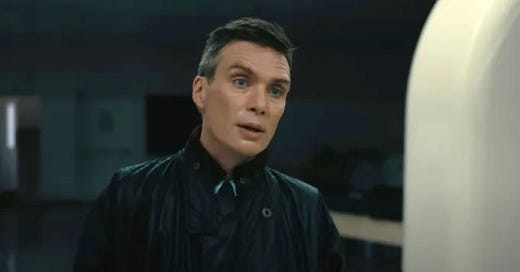I fought through a horde of Barbie viewers today to see Oppenheimer. The lobby of the small theater was filled with women in their 20s who look like they are still in a sorority, lined up to see Barbie. I got through and made my way to the front row to see Oppenheimer (only front row tickets were available). There were lots of Barbie viewers who were just there to dutifully complete the dialectic. The theater was packed which is weird for a 3 hour biopic about the man who made the atomic bomb. Immediately after the movie ended and the text OPPENHEIMER came up on the screen, some bro in the row across from me went “Niiiiiiice.” It was said in this weird way, as if to just register that one half of the Barbenheimer dialectic had been complete—so the bro can just go along and tell his bro friends that he did it.
The movie itself is good…certainly better than most things that come out nowadays. The most striking thing about it to me is not the content so much as the form—and how they mirror each other. Oppenheimer the film itself is a kind of weapon: a three hour movie with constantly blaring theme music, and no scene lasts for more than like 90 seconds. The whole thing feels like a long trailer for a movie that never really arrives, and you feel dizzy and bombarded. It’s a movie about a weapon which is itself also a weapon. It felt a bit like Nolan himself became the mad inventor of a weapon, like his subject Oppenheimer was—that to fully depict and dramatize his subject, Nolan had to do what Oppenheimer did, and create an experimental, unstable weapon.
One effect of how fast it all moves, and how short the scenes are, is how impersonal it all feels. It really captures the feeling of impersonality that’s central to all big projects—and the Manhattan Project was the biggest of all projects. So much of the movie is people walking by each other, and having these clipped little conversations in doorways where they aren’t really stopping. Nothing ever stays still enough for you to fully understand the big picture. It’s all just little snippets that you never see the totality of—but it all adds up to the atomic bomb.
There aren’t many memorable moments in the film, because of how short all the scenes are, how fast it all moves, and how impersonal it is. (Maybe this is why Nolan put the sex scene in, so there’s something that sticks out. Pun intended. The sex scene, early in the movie, features the most iconic Oppenheimer-related thing: the line from the Bhagavad Gita about “Now I am become death, destroyer of worlds.” His lover asks Oppenheimer to read the line from the book while he’s fucking her—the most famous line delivered mid coitus. Pretty memorable).
And even when Oppenheimer himself is done building the bomb, he doesn’t have ownership of it. It becomes depersonalized from him. There are some moments where he feels like he should have been more central, like after the bomb was dropped, and he gets one curt phone call from the general who oversaw the Manhattan Project. You can feel how he wanted more than that…but what did he want? He was recruited to make a bomb, he made it, and then it belonged to the military, and his role was over.
The best scene, in my view, comes shortly after the bomb was successfully tested, and some of the younger scientists at Los Alamos are having a discussion about the ethics of dropping the bomb. Someone makes the point that Germany has already been defeated, and Japan will surely follow soon—so what is the point of dropping an atomic bomb?
Oppenheimer comes in during this discussion, out of the rain, and feels compelled to argue on behalf of the bomb. Even though it’s pretty obvious that the points being made at the meeting are correct—there is no moral reason to drop a bomb on an enemy who is already just about to be defeated—he can’t just agree with it. That would be to invalidate the whole project he worked so hard on.
Visually, when he comes into the meeting to defend his bomb, in his black rain coat, he looks very much like a Nazi. I think it was intentional—his most evil moment, defending his demonic weapon against reasonable, well-intentioned younger scientists—and he looks as evil as possible. It was a really well-done, subtle depiction of how casually evil he had become. It’s a scene that isn’t really made that big a deal of, and it passes pretty quickly (like every scene in the movie). But something about his appearance in that scene, as he tries to make a positive argument for the morality of the atomic bomb, is uniquely chilling. In this moment, he fully turned himself into a weapon.
See?





Niiiiice
One scene that sticks in my memory is Oppenheimer being grilled by Casey Affleck's Russian White demon (nothing more evil than a Boston guy playing a Russian White) , and he just can't help yapping and snitching on his friends and colleagues.